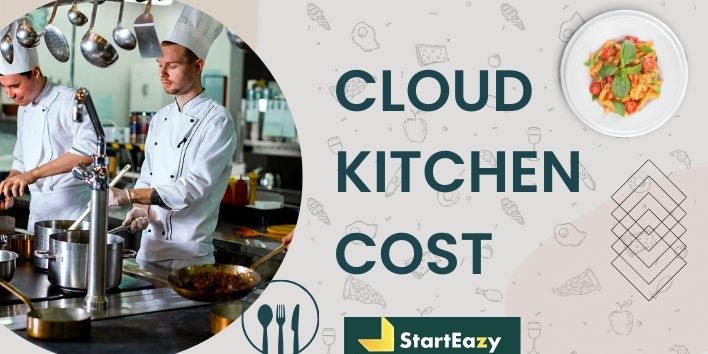Cloud Kitchen Cost Breakdown | A Comprehensive Guide

Starting a cloud kitchen in India is an exciting venture, offering the flexibility to serve a wide audience without the overhead costs of a traditional restaurant. However, understanding the cost breakdown is crucial for setting realistic expectations and ensuring long-term success. Knowing how to start a cloud kitchen the right way can pave the path to a profitable and sustainable business model.
In this guide, we’ll walk you through the essential costs associated with launching a cloud kitchen, including equipment, rent, licenses, marketing, raw materials, and more.
Whether you’re a budding entrepreneur or an established restaurateur looking to expand, this comprehensive breakdown will help you plan your investment wisely.
1. Equipment and Machinery: The Backbone of Your Kitchen
The foundation of any successful cloud kitchen is its equipment and machinery. The type of cuisine you plan to offer will dictate the specific tools you'll need, but some basics are essential across the board.
Investing in the right equipment not only ensures smooth operations but also impacts the quality of the food you serve.
-
Indian Burner and Chinese Burner: These are essential for most kitchens, particularly those offering Indian or Asian cuisine. The cost can range between ₹60,000 to ₹70,000, depending on the brand and specifications.
-
Stainless Steel Tables: These are crucial for maintaining hygiene and durability in the kitchen. Prices vary, but they can be sourced affordably from local vendors.
-
Electric Ovens: For cloud kitchens specializing in baked goods or pizzas, electric ovens are a must. These can range from ₹12,000 to several lakhs, depending on the size and quality.
-
Gas Tandoor: If your menu includes tandoori dishes, a gas tandoor is indispensable. Prices start at around ₹5,000 and can go up based on the size and brand.
Pro Tip: To save on costs, consider purchasing second-hand equipment from platforms like OLX, Justdial, and QuikrBazaar. Additionally, a visit to Gaffar Market in Delhi can yield great deals on second-hand appliances that are still in good condition.
2. Location: Finding the Perfect Space
One of the advantages of a cloud kitchen is the flexibility in choosing a location. Unlike traditional restaurants, cloud kitchens don’t require prime real estate since customers never visit the premises. However, the location should still be strategically chosen to minimize delivery times and costs.
-
Rent for a 100-200 sq. ft. space:
-
Tier II or III Cities: ₹8,000 to ₹10,000 per month.
-
Metropolitan Cities: While rents are higher, careful lease negotiation can make it manageable.
-
-
Security Deposit: Typically, landlords require a security deposit of ₹50,000 to ₹1,00,000, depending on the location and property.
Pro Tip: Ensure the space is legally converted to a commercial property and secure all necessary licenses, including FSSAI, Trade License, and Commercial Electrical Connection. Skipping these steps can lead to legal issues and operational disruptions.
3. Raw Materials: Stocking Your Kitchen Wisely
Raw materials are the lifeblood of your kitchen. Proper inventory management is essential to avoid waste and manage costs effectively. Overstocking can lead to spoilage, while understocking can cause delays in fulfilling orders, negatively impacting customer satisfaction.
-
Initial Budget: A starting budget of ₹20,000 is recommended to cover the first few days' worth of ingredients. This amount should be adjusted based on your menu and expected order volume.
Pro Tip: Purchase in bulk to save costs, but only after you have a clear understanding of your daily requirements. Building strong relationships with reliable suppliers can also help in negotiating better prices and securing quality ingredients.
4. Cloud Kitchen Layout: Optimizing for Efficiency
The layout of your kitchen plays a significant role in determining your operational efficiency. Unlike dine-in restaurants, cloud kitchens focus solely on preparing food for delivery, so the design should prioritize workflow and productivity.
-
Popular Layouts:
-
Assembly Line: Ideal for high-volume production, this layout divides the kitchen into stations for ingredient preparation, cooking, and plating/packaging.
-
Zoning: This layout segregates the kitchen into areas based on the type of food being prepared, which helps in managing multiple cuisines or large orders.
-
Galley: Suitable for small spaces, this layout places stations and equipment along the walls, maximizing efficiency in compact areas.
-
Island: Centralizes cooking equipment, allowing chefs easy movement and interaction, with food prep and dishwashing areas along the perimeter.
-
Pro Tip: Choose a layout that aligns with your menu and expected order volume. An efficient setup can significantly boost productivity, reduce operational costs, and improve order accuracy.
5. Packaging: The Key to Building Your Brand
In the cloud kitchen business, packaging is more than just a necessity—it's a vital component of your brand identity. Good packaging not only protects the food during delivery but also enhances the customer experience and leaves a lasting impression.
-
Cost: Depending on the quantity and quality of the packaging materials, expect to spend between ₹40,000 to ₹60,000.
Pro Tip: Invest in high-quality, branded packaging that reflects your brand’s identity. For example, Domino’s includes complimentary sachets of oregano and chili flakes, which not only adds value but also subtly promotes the brand. Consider using laminated white GSM boards for a professional look, and include your logo and contact details on all packaging.
6. Marketing: Creating Buzz Before You Launch
Marketing is a critical aspect of any business, and it should start well before your cloud kitchen opens its doors (or, in this case, its delivery channels). Building anticipation can lead to a successful launch and set the stage for sustained growth.
-
Pre-Launch Marketing: Leverage social media platforms like Facebook, Instagram, and YouTube to run targeted ads. Encourage users to sign up for updates or special launch offers, creating a sense of excitement.
-
Initial Marketing Budget: Allocate at least ₹10,000 for creating compelling ads and promotional materials that will attract your target audience.
Pro Tip: Use design tools like Canva to create eye-catching ads, or hire a graphic designer for professional-quality visuals. Building a customer base before launch can lead to higher initial orders and better visibility on food delivery platforms like Zomato and Swiggy.
7. Choosing an Online Food Delivery Platform
Partnering with online food delivery platforms like Swiggy and Zomato is essential for cloud kitchens. These platforms provide a ready-made customer base and handle the logistics of delivery, allowing you to focus on what you do best—cooking.
-
Commission: Expect to pay a 20-25% commission on each order, which is a standard industry practice.
-
Registration: Ensure you have the necessary licenses (FSSAI, GST) and documents like a canceled cheque or bank passbook to register your cloud kitchen on these platforms.
Pro Tip: Start by offering a limited menu to streamline operations and ensure that you can deliver consistent quality. This approach will help you manage your kitchen more effectively and reduce the risk of errors during the initial phase.
8. Legalities and Registration: Ensuring Compliance
Proper legal setup is essential for the smooth and lawful operation of your cloud kitchen. Securing the necessary licenses and registrations helps you avoid fines and operational disruptions. Here’s a comprehensive look at the key legalities and registrations required:
-
FSSAI License (Food Safety and Standards Authority of India)
The FSSAI License is mandatory for any food business in India, ensuring that your food meets safety and quality standards set by the Food Safety and Standards Authority of India.
Requirements: Apply through the FSSAI website or local authorities. You’ll need to submit documentation related to your business premises, equipment, and food safety practices.
-
Trade License
A Trade License, issued by local municipal authorities or the municipal corporation, authorizes you to operate a commercial establishment within a specific jurisdiction.
Requirements: Apply at your local municipal office, providing details about your business location, ownership, and activities.
-
Commercial Electrical Connection
A Commercial Electrical Connection ensures that your kitchen has the appropriate power supply for operations, meeting safety and compliance standards.
Requirements: Apply through your local electricity board, providing details about your business premises and electrical needs.
Registering your company as a separate legal entity establishes its identity and protects personal assets. This step is crucial for legal and financial reasons.
Requirements: Register with the Ministry of Corporate Affairs (MCA). Choose a business structure (e.g., Private Limited Company, Limited Liability Partnership) and submit necessary documents like proof of address, identity of directors, and the company’s Memorandum of Association.
-
GST Registration (Goods and Services Tax)
GST Registration is required for businesses whose annual turnover exceeds the threshold limit set by the GST Act. It enables you to collect GST from customers and claim input tax credits on purchases.
Requirements: Apply through the GST portal, providing business details, proof of address, and identity documents of the proprietors or directors.
Other Registrations
Depending on your business model, additional registrations might be required:
-
Shops and Establishment Act Registration: Typically required for operating a commercial establishment in most states.
-
Health Trade License: If your kitchen deals with food processing.
9. Cloud Kitchen Profit Margin: Maximizing Your Earnings
Understanding the cloud kitchen profit margin is essential to ensure your business remains sustainable. Typically, cloud kitchens have a profit margin ranging between 20% to 25%.
Factors such as food costs, delivery charges, and operational efficiency play a crucial role in determining your margin.
Final Thoughts: Budgeting for Cloud Kitchen Success
Starting a cloud kitchen in India typically requires an investment of ₹5 to ₹6 lakh, covering essentials like equipment, rent, raw materials, and marketing. Strategic planning and smart investments can make launching your kitchen on this budget achievable.
Pro Tip: Set aside a reserve fund for unexpected expenses in the initial months. This financial cushion can be vital for navigating the early stages and securing your business's future.
At StartEazy, we specialize in helping entrepreneurs with legal compliance for their cloud kitchens. If you're ready to launch and need expert guidance on legal matters, reach out to us by filling out the form on your right.
Reach out to us for tailored advice and resources to ensure your cloud kitchen operates smoothly and within regulations.








